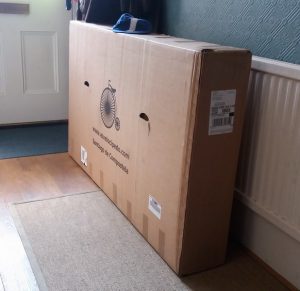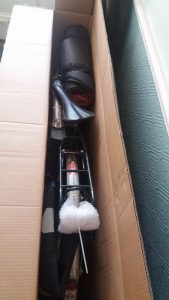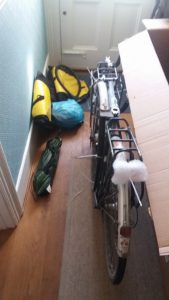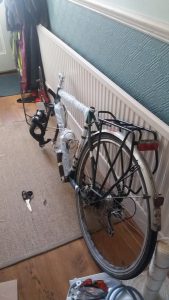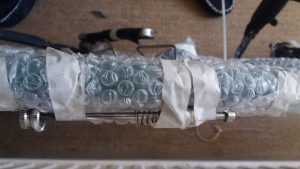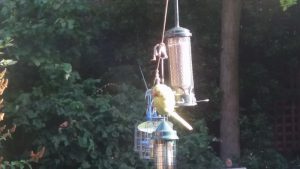Saturday, in my old, pre-pilgrimage way of life, was a day in which I would generally cycle from home to Waitrose in Balham, and pick up foodstuffs for the week and a free coffee and a free Guardian. Such is the almost irresistible allure of Waitrose’s largesse.
This weekend was the first time I got back to the routine and Toto and I got soaked on a round trip. We set off first to the local charity shop with two panniers’ of things to pass on, then the local recycling tip in hope some other things will be recycled. The tip now requires proof of local residence, at least theoretically, in fact they didn’t check the bits of paper I’d found with my name and address on them. Apparently this is now needed in case aliens from another London borough, or even, heaven forbid, even further away, attempt to use the facility. I miscalculated, I’ve forgotten about British weather, and the heavens opened on us as we pottered off to those lovely locations, and Toto and were both pretty bedraggled, despite the sun coming out again, by the time we got to up market Balham. The caked Spanish dust is slowly coming off Toto.
As I tethered him, with “two good locks”: this is London not the pilgrimage any more, a man hopped off a road bike of a certain age and tied it up next to Toto and said something obviously friendly but totally incomprehensible to me. (I really am going a bit deaf!) I said “Sorry” in a very British sort of way and he said, more slowly this time so I got it “Have a good weekend”. I managed “thanks, er, you too” and probably something about cycling being good despite the weather, with which he agreed. Then I ventured, sensing he wouldn’t be offended, “Where are you from?” as the thick accent was recognisably European, and I was hazarding “former Iron curtain Eastern Europe” but nothing more localised than that. “Poland” was the beaming answer, “Krakow” and now I could say …
“Ah, I/we have been there. Lovely city.”
“Yes, 850 years”
“Yes, historical, very beautiful, lovely.” (OK, I’m rubbish at this conversation thing, I know.)
“Yes, 850 years”
“Yes” (OK, I was bluffing I admit it, I hadn’t a clue why 850, my recall of Krakow’s history wasn’t up to that.)
“When you there, [perhaps] you [went to?] salt mines.” (You have to hear his side of this in a really glorious, deep toned voice and a very, very thick accent, but now I’d attuned, completely comprehensible.)
“Yes!” (With ear to ear grin on my face). “Real tourists! Wonderful, amazing, enormous.”
“Thirty years ago I worked in salt mines.” (I was computing that that was entirely possible from what I could remember, I’m stronger on the recent than the distant history of Krakow. I reckon it probably made him a member of the workforce that was there as they closed the mines, partly through fears that the washing out of the salt layers might be reaching under Krakow itself and be causing serious risks of subsidence. That must have been quite a time to have worked there. I’m damn sure he was telling me truth anyway.)
“Wow. They were amazing. Hard work. That church.” (Yes folks, I think it was as staccato and disjointed as that.)
[He had huge grin now on his face too.] “Yes. Yes. You saw that.” [Face changed, I think going back to the mines and picturing it too. I wonder how much what he would remember would match what we saw as tourists.]
“Yes. Hard work.”
“Yes” [Sounding unconvinced actually but too polite to disagree but then …] “Yes, salt mines same everywhere, Krakow, Poland, everywhere.”
“Yes.” (I’m inclined to accept that. In my view, damn hard and potentially dangerous work anywhere though I’m sure it varies a bit.) “What are you doing now?”
“Work for Surrey council.” (Not far away, a few miles down the road.) “In Poland, I worked in revenue.”
“Ah” (genuinely interested but unsure how to move on and becoming faintly aware I needed to get a move on to get to Stratford East to meet J later.)
“Because my English not so good, I not so good job here.”
“Ah, and expensive living here.”
“Ah. Yes, but good. I go to Peckham Rye” (a few miles East of us and now gentrifying rapidly but until a a few years ago having been well down the social strata below Balham, or below our own neck of the woods here in South London.) “Big Indian shops. Buy five pound bags frozen mackerel for £5. Cheap.” (Very true. I must sleuth that out. Maybe I should alternate Waitrose one week, big Indian shope in Peckham Rye the next.)
[Pointing into Waitrose, which for non-UK nationals reading this, is a very “posh”, and not a cheap supermarket.] “Ah, but this isn’t cheap.” (Ouch, as I write that it sounds rude, I think/hope my face was conveying what I was feeling, a complicity in self-indulgence. I think it was because …)
[With big grin on his face] “Yes, but I love Roquefort cheese!!!”
[At which we both started moving towards the entrance and he put out large hand …]
“Tomasz” (OK, that’s my guess at correct Polish spelling, I think I’ve met some Polish “Thomas”s.]
“Chris”
And then I found myself lingering, a bit stunned by the sheer pleasure of savouring such a lovely encounter, but also savouring memories of a very good work trip to Krakow, which is (and J and I have 100% agreement on this) a lovely, remarkably undamaged, truly historic city where we were made incredibly welcome by my/our hosts, Milena and Andrzej and their colleagues at the Polish Institute for Integrative Psychotherapy.
I stood there for a moment and was gazing at a wonderful, bright red bike with a full kiddie carrier at the front and onboard electric motor, clearly a pretty new Larry vs. Harry bike but my mind was miles away (just how far is Krakow? Aha, 880.6 miles, 1417.3km by air according to distancefrom.net, ooh, and 1,009.6 miles, 1624.9 km by road. Aha, now that’s another nice cycle ride!)
Down tiger! OK, I suspect my mouth was hanging open a bit, more in sheer pleasure at the conversation I’d just had, than at the bike, but not unreasonably a voice, this time with only the tiniest of accents, that might have been UK, said “Admiring the bike eh?” so I agreed (there’s only so much explaining the realities of his internal world that even this blogger will do outside Waitrose on a late Saturday afternoon in Balham).
Trying to recover my cool, I noticed that the man had a Clare Hall boat club top on. Now, and this time not only for non-UK people finding themselves reading this, but probably for anyone who didn’t blag your way into Cambridge University, or who never wanted to, or who wouldn’t be seen dead there, Clare Hall is one of the smaller (smallest?, not quite) of the colleges that make up that august institution. Oh and, yes as I’ve confessed before, posh person that I am, posho who shops in Waitrose, I spent three years there as an undergraduate. Now, as well as seeing 40 films for probably about £20 in my first eight week term, and learning a bit about medicine, Cambridge was where I discovered rowing and, by a triumph of enthusiasm over any real ability, made it to the Queens’ College first eight and had great, great fun rowing, particularly in the second and third terms of my first year. After that, sadly, I gave it up as Queens’ decided we were a good team, which we were, on team spirit again, rather than real ability, and decided that the first and second eights would train six days a week … not me mate,I had films to see, parties to go, lectures six days a week (honestly) and six training sessions a week was about two more than I wanted. The twist was that if you’d rowed in a first eight, then the Cambridge rules of the river said you couldn’t row lower than a second eight … so, that was my short but fun rowing career over.]
So here you are. One of the benefits of spending time recently throwing out old junk, is that I know where old junk I haven’t thrown is sitting. So once more into the TARDIS (you did read the last blog post didn’t you?)
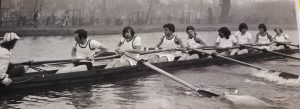
That is autumn 1975 and that I’m sure is the Cambridge “Head of the river race” and in there is your time challenged blogger himself with seven other completely novice oarsmen (though I have a faint memory that the cox had done his bit before at school). That really, really is how not to row but dig those hair styles, come to that, dig that I had hair.
And this was what two further terms practice achieved.

That is the Queens’ College second eight, and yes, I’m there again, in fact I think I and that cox are the only people in common across the two ‘photos and perhaps I’m wrong about him. This crew were doing pretty well in the May bumps at the time of that ‘photo. I’m pretty sure this time that the cox, number 8 and 7 had rowed before but the other six of us were beginners. Hm. I can even find the names:

That’s the oar we won, well actually, you had to pay for one and it amused me at the time. That’s not the seat order we were in in the ‘photo but I’m pretty sure that’s the right nine names. (I’m not sitting in the seat in the ‘photo that the ‘photo has me in but someone gave the painter the wrong information including some pretty odd weights actually. Anyone who knows me want to say which is me in the two ‘photos bearing in mind that the oar is not a safe clue except that it eliminates one seat. Answers at the end of this blog, and a bonus point for anyone who notices anything else odd.
OK, back in the TARDIS and whizz forward about 40 years. He of the rowing top and I talked. I teased him that in my days, in the century before he’d been in Cambridge, I’d had the satisfaction of “overbumping” a Clare Hall boat and we immediately agreed that they were a tiny college. [Ouch, I really believed that at the time I was talking to him, think I was muddling it with a bit of side-by-side racing we did against them at some regatta. As you can see from the information on that oar, we overbumped a much bigger college: Trinity. How could I have forgotten that? It was a huge feather in our caps!]
Somehow talking about electric bikes took us, via whether or not J should use one to my pilgrimage and he was enthusiastic and nice about it. I learned what he, a Dane speaking perfect English with only that faintest of accent, was doing in the UK. It turned out that he’d met his wife, a fellow student, I think from Spain, in Cambridge and they were both helping keep this country alive and both their children, the three year old for the kiddie carrier, and the nine month old, I am sure will do so in the future given a chance.
Damn Brexit, damn, damn, damn Brexit …. but oh boy, those were two, radically different, but lovely conversations. Both men leave me standing for warmth and willingness to launch into conversation with complete strangers. Both conversations were, I think, triggered by bikes which may be the trick to make me a sociable human being. It all reminded me forcibly that conversations with complete strangers had seemed so mcuh to be permitted on the pilgrimage route and had all been good. More importantly, it reminded me that the same is surely true anywhere (though I seem to need a pushbike to start the conversation).
Damn, damn, damn Brexit and, … oh boy we’re not in mainland Europe any more Toto. On which note, let’s hop into the TARDIS again and visit Krakow back in November 2010.
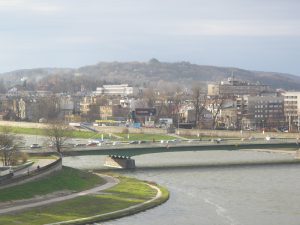
The main square, surely hints of Venetian gothic to the building on the left.


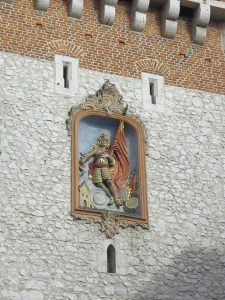

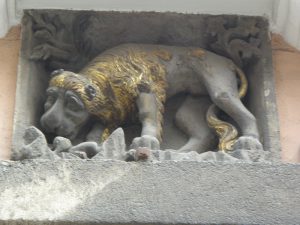
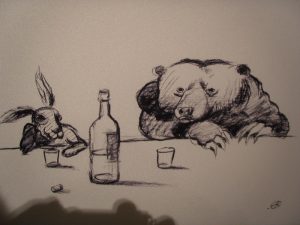
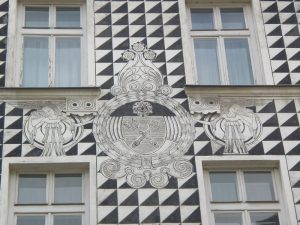


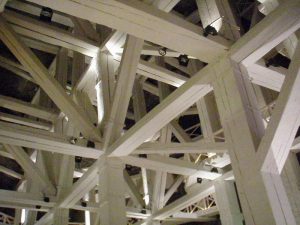
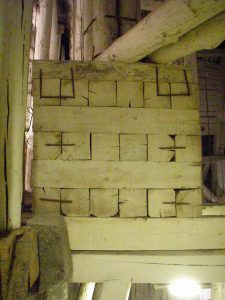

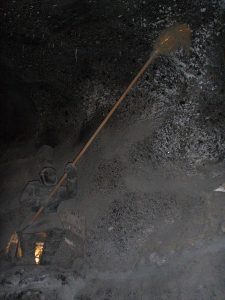
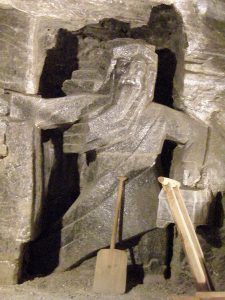
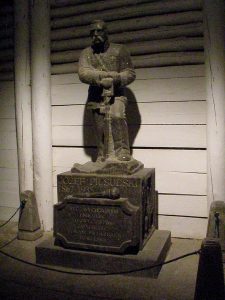

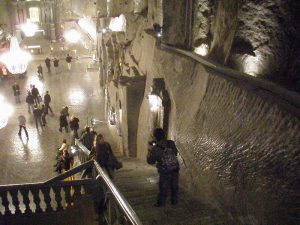
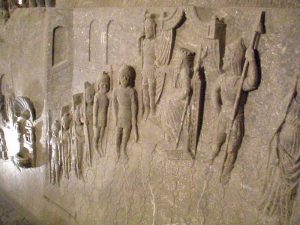
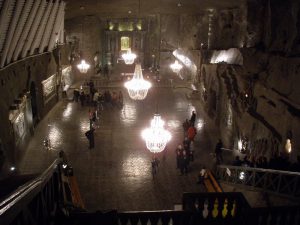

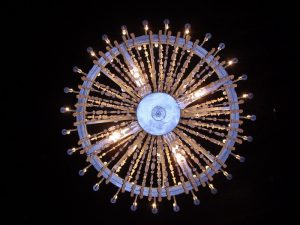
And, last but not least, samples of a huge table of food.
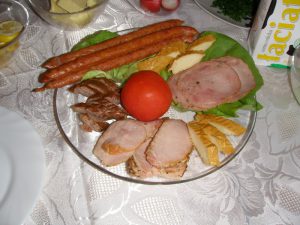
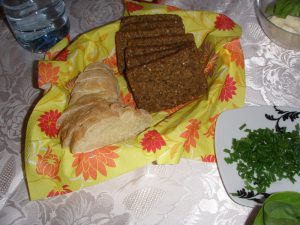
Very happy memories: thank you Tomasz.
